Society for the Study of Women Philosophers, Inc.
a non-profit, tax-exempt educational charity 501(c)3 Internal Revenue Code
June 2015 Newsletter
What's in this Newsletter
- Executive Board Welcome to New Members
- NEWS: SSWP meeting at APA Eastern Division Conference
- APA Letter on Sexual Harassment
- Report: Helsinki Conference
- Members' recent & forthcoming publications: Karen Green, Ruth Hagengruber
- Review of Karen Bo Lee by John Conley
- Congratulations: Dorothy Rogers, Sandrine Berges
- Fun & Games: Where in the World Are Women Philosophers Publicly Acknowledged? Submit your Photos/Maps
- Website Reorganization Kate's Pages
- Saga of the BUSTED DVDs Voume 2 Samplers?? Busted DVD 3 TOC
- Calls for Submission
- Reminders: Amazon Smile, Reminder: Complete your Bios; Reminder: 2016 Dues
- Correction: IAPH
- SSWP Website: Statistics about our viewers.
- Request for Volunteers
1. Welcome New Members!
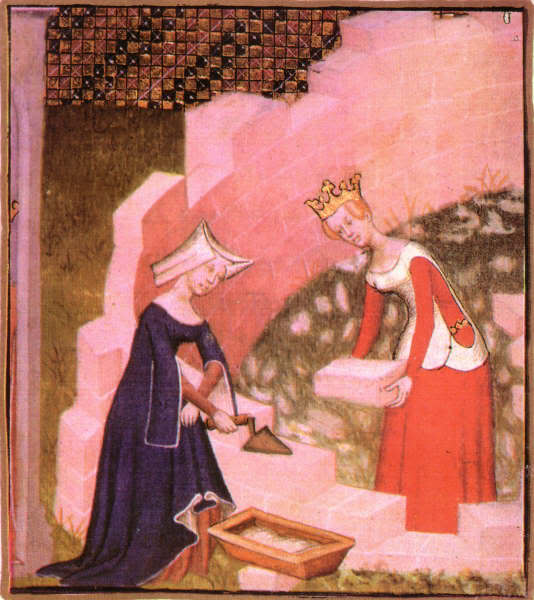 Above Christine de Pizan. Illustration from her City of Ladies. |
This section was accidentally deleted after publication. Will reconstruct new members: Nancy Tomaselli, Susanne Sreedhar, Sister Lee Anne___, , Sandrine Berges, Karin Fontein, + others?. Will reconstruct from PayPal account list. |
2. News: Turkish-European Network
The first step in reforming the canon of philosophy is identifying those persons who are philosophers, and identifying the works and/or teachings that they have bequeathed to us but that have been hidden, often for millennia. We Americans and Europeans have made great strides in the past several decades, identifying women philosophers from our traditions. Less work has been accomplished to identify women from outside the western tradition, especially women who may have written in non-western languages, who may represent lesser-known philosophic traditions, or who may have taught at institutions that no longer exist. It is important therefore that we in SSWP support and encourage informal organizations such as the Turkish-European Network for the Study of Women in the History of Philosophy.
 |
If you have colleagues who might contribute to or benefit from participating in this network, please send them Dr. Berges' contact information. Turkey, half in Europe, half in Asia, is ideally located for colleagues who are in Europe, the Middle East, Asia and Northern Africa who might have difficulty networking with other scholars specialized on the history of women's contributions to philosophy, or difficulty travelling to conferences that are focused on the contributions of women to this field. - Mary Ellen Waithe |
3. Report:
APA Letter on Sexual Harassment
|
In the United States, and no doubt elsewhere, women are grossly under-represented as philosophy professors, and, as graduate students in the discipline. Judging by the numbers alone, academic philosophy appears to be a discipline in which there is widespread discrimination against women. Related to this lack of representation is the horribly unethical phenomenon of sexual harassment of women by male philosophy professors. Several cases in the United States and Canada have prompted widespread news coverage. In an attempt to clarify the kinds of behaviors that may constitute sexual harassment, The American Philosophical Association has just disseminated its official position on sexual harassment. SSWP's founder, the late Veda Cobb-Stevens, intended SSWP to be a professional society that addressed the contributions of women past and present, and that provided a platform for women philosophers to examine their role in the profession. Most of SSWP's emphasis in recent years has been on the former: creating a professional society of scholars whose primary research interests are in recovering and restoring to the canon works by women philosophers of centuries past. The APA letter is reprinted here because it is directly relevant to the latter task: examining the role of women in the profession. June 16, 2015 This is an open letter, addressed first and foremost to victims of sexual harassment within the profession of philosophy, and secondly, to all members of the APA. Some of you have come forward and pressed complaints against your harassers, assuming the burden of embarking on a time-consuming and psychologically draining process. Some of you have reached out to the APA ombudsperson for resources and advice. Some of you have consulted officers at your institutions, and some of you have relied on supportive friends or colleagues. Some of you are silent victims. Many of you have not received adequate support from your colleagues and redress from your institutions. All of you, we assume, have had both your personal and your professional lives deeply affected by your experiences. These effects are likely to endure for years to come. The damaging experience is not limited to the sexual harassment itself. Some of you have seen your harasser given what does not seem to be a penalty—for example, a paid leave of absence. Others have seen your harasser evade penalties by taking a new job. Some of you have not been believed, had complaints ignored or trivialized, and been treated as though it is you who is the problem. All of you who remain in the discipline of philosophy face the prospect of encountering your harasser in professional philosophical settings whether at your academic institution or at philosophical conferences. We, the board of officers of the APA, want you to know that we recognize the hardship imposed on you and the structural obstacles to recognizing and addressing sexual harassment. We call upon all philosophy departments to commit to eliminating sexual harassment; the first step toward this is vigorously and immediately pursuing all allegations of sexual harassment. It is the responsibility of all members of the APA to know the legal definition of sexual harassment and the rules for bystander reporting under Title IX of the EducationAmendments of 1972. We strongly encourage all APA members to |
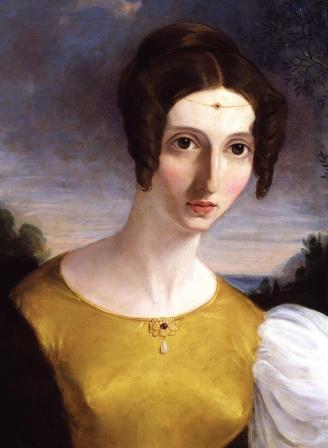 Harriet Taylor Mill 1807-1858 Harriet Taylor Mill 1807-1858familiarize themselves with the APA statement on sexual harassment. APA members need to be fully aware of the pervasiveness and impact of sexual harassment, and we recommend reading the narratives on the blog What Is It Like to Be a Woman in Philosophy? We encourage departments to avail themselves of the Committee on the Status of Women’s Site Visit Program. Victims are encouraged to consult the APA ombudsperson for nondiscrimination for advice. When you attend professional meetings, we encourage you to call on supportive colleagues who can help you ensure a positive conference experience—for example, by setting up an informal buddy system. If you have a restraining order against your harasser, you should notify the APA prior to a divisional meeting, since your harasser may be barred from attending. Complaints of sexual harassment at APA-sponsored activities should be brought to the APA ombudsperson for nondiscrimination. At APA divisional meetings, the APA placement ombudsperson, normally the chair of the committee on academic career opportunities and placement, is authorized to receive complaints from individuals about institutions that fail to comply with Title IX with respect to sexual harassment or sex-based discrimination. We recently consulted with legal counsel regarding the APA's additional options for responding to sexual harassment; we explored sanctions such as denying conference registration by or revoking the APA membership of those found by their institutions to have committed sexual harassment, as well as supportive actions, such as providing victims with a buddy system at APA meetings. Unfortunately, these kinds of measures open the APA to excessive legal liability. We are committed, both personally and as the primary governing body of the association, to combatting the widespread and well-documented problem of sexual harassment in our profession and to supporting our colleagues who have been victimized by sexual harassment. We hope that all members of the profession will stand with us in condemning sexual harassment in all its forms, and in supporting victims of sexual harassment so that they may continue their professional lives as valued members of our discipline. Signed, The Board of Officers of the American Philosophical Association |
4. Report: Helsinki Conference
Women in the History of Philosophy: Methodological Reflections on Women's Contributions and Influence
The conference "Women in the History of Philosophy: Methodological Reflections on Women's Contributions and Influence" was held June 15th & 16th at the Helsinki Colegium for Advance Studies. The aim of the conference was to contribute to an ongoing reconstruction of the canon of philosophy by addressing methodological questions, studying women thinkers as inventors and as developers of ideas, and also as initiators of new modes of asking philosophical questions. In addition, it considered how the disappearance of female contributors has affected the discipline of philosophy itself, and how the reintroduction of works by women philosophers may influence contemporary academic philosophy.
|
SSWP member Ruth Hagengruber, pictured, right, from the University of Paderborn gave the opening address: “Women Rewrite the History of Philosophy – Two Paradoxes to Overcome.” For additional details see Members' Recent and Forthcoming Works on Women Philosophers, below. Other speakers and their papers included: Miira Tuominen (University of Jyväskylä): “On the (Methodological) Problems in Studying Women Philosophers in Antiquity;” Lisa Shapiro (Simon Fraser University): “What is a Philosophical Canon?;” Karen Detlefsen (University of Pennsylvania): “The Limits of Contextualist History of Philosophy: Female Friendship and Education in Cavendish’s Plays;” Sarah Hutton (University of York): ”Context and ‘Fortuna’ in the History of Women Philosophers: a Diachronic Perspective;” Nora Hämäläinen (Helsinki Collegium for advanced studies): “Iris Murdoch on Pure Consciousness – or “An Exercise of Oneself in the Activity of Thought;” Robin Wang (Loyola Marymount University): “Kundao: Women Thinkers and Practitioners of Dao in Eleventh Century of China;” Robin May Schott (Danish Institute for International Studies): “Arendt, Natality and Vulnerability;” Naoko Saito (Helsinki Collegium for Advanced Studies/Kyoto University): “Feminism of the father tongue: Replacing the subject of philosophy.” |
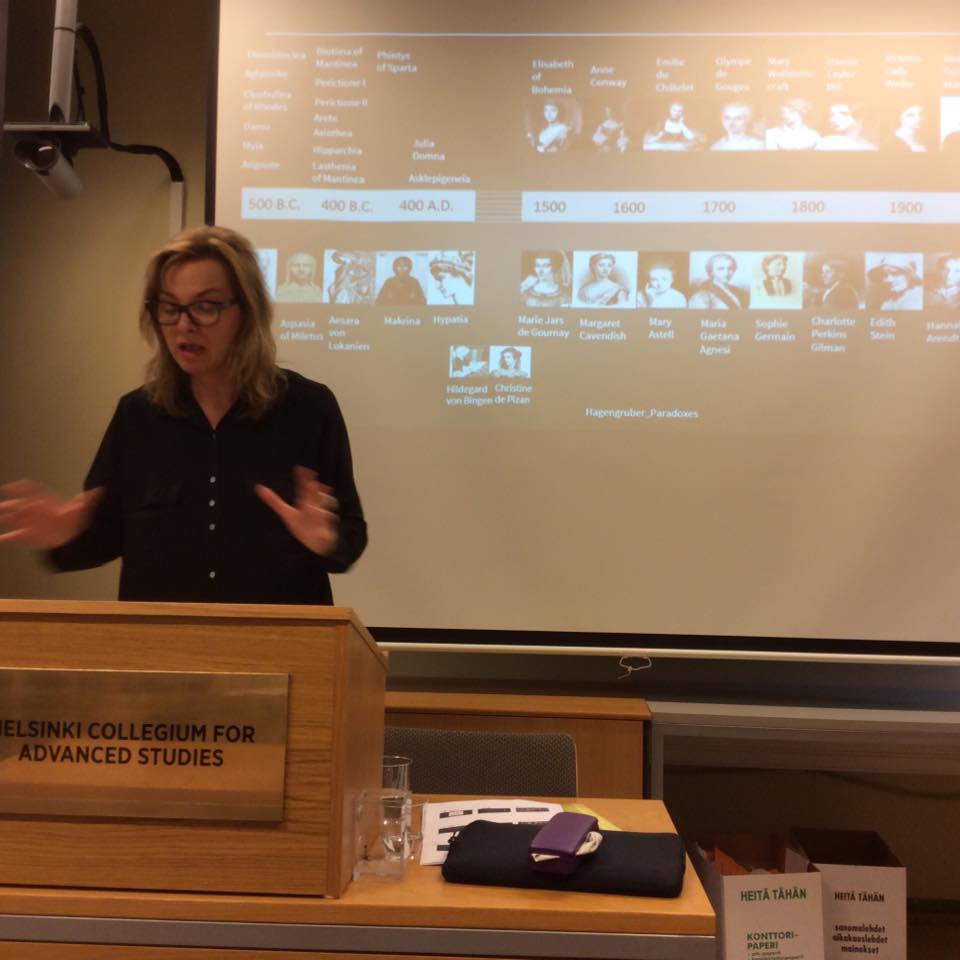 Above: Ruth Hagengruber Below: Martina Reuter (left) introduces Sarah Hutton 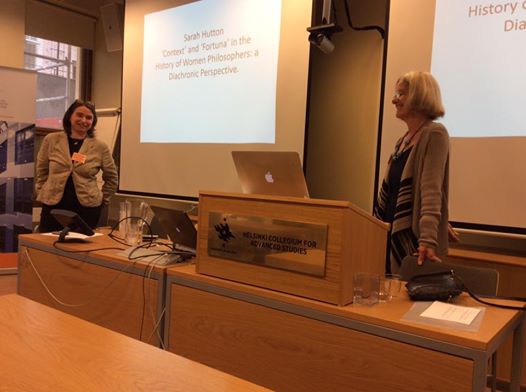 |
5. Members' Recent & Forthcoming Works on
Women Philosophers
|
Karen Green, A History of Women's Political Thought, 1700-1800 (Cambridge: Cambridge University Press, 2014). This work contains discussions of the political and philosophical ideas of Elizabeth Elstob, Catharine Trotter Cockburn, Mary Delariviere Manley, Anne Lambert, Louisa Kulmus Gottsched, Françoise de Graffigny, Emilie Du Châtelet, Octavie Belot, Catharine Macaulay, Mary Wollstonecraft, Mary Hays, Olympe de Gouges, Louise Keralio-Robert, Etta Palm d'Aelders, and Elise Reimarus among others. |
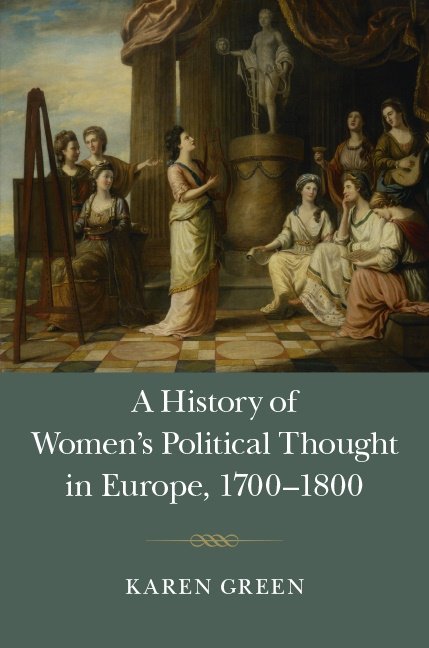 |
Ruth Hagengruber, University of Paderborn, presented the opening paper at the Helsinki Conference "Women in the History of Philosophy: Methodological Reflections on Women's Contributions and Influence" To oversimplify Professor Hagengruber's argument, rewriting the history of philosophy to accurately represent women's contributions to it means that we are accepting as paradigmatic of what constitutes philosophy those issues, problems, topics and methodologies that have been developed by men. If we accept them, then we accept the exclusion of women's interests, concerns, methodologies and even genres from the canon. This, notwithstanding the fact that many women contributed to the discipline thus defined by men. And including those works in the history of philosophy has the paradoxical result of accepting women's work as that has been defined by men. She refers to this paradox as "the inclusion of the excluded."
An equally fundamental paradox is what she calls the "gendering of the universal." If males have always defined what philosophy is while simultaneously claiming that the criteria for "being a work of philosophy" are universal, or at least, general criteria, then those criteria are likely to be male-gendered. Adding "feminism" to them may expand the contents of the canon of philosophy somewhat but it also has the effect of blinding us to the possibilities that other genres, other problems, other methodologies may merit inclusion in that canon. Adding "feminism" to the criteria means only that the male-gendered "universal" has been expanded; it doesn't make the canon any less male-gendered. Thus, the "universal" does not refer to "universal" criteria, but only to criteria that are compatible with the masculist description of philosophy.
However, at least some women philosophers have introduced important philosophical concepts and arguments that would satisfy a criterion of universality. Amongst these are the ideas (1) that an omnipotent deity (as distinct from minor deities e.g. in the Hindu tradition) would have no sex, (2) the historicity of science, and (3) the argument for universal civil rights for for all humans regardless of gender or race. Thus, some women philosophers, by avoiding the second paradox, would merit inclusion in the broader canon and thereby avoid also the first paradox.
6. Review of:
Bo Karen Lee, Sacrifice and Delight in the Mystical Theologies of Anna Maria van Schurman and Madame Jeanne Guyon
by John Conley
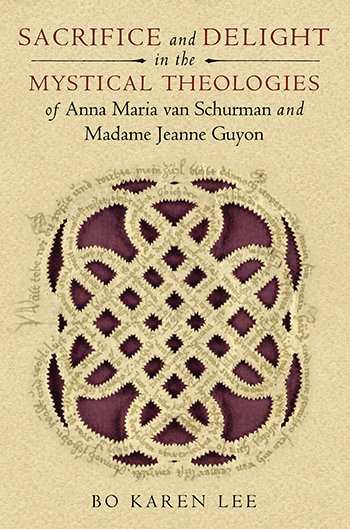 Having mastered biblical languages and Calvinist theology, Van Schurman published a series of erudite tracts on religious topics. Guyon, on the other hand, had little formal education. Her voluminous pamphlets, written at great speed, often have the quality of automatic writing as they promote a Quietist type of simple prayer. Despite these disparate backgrounds, Lee detects a similar, paradoxical spirituality operative in their religious philosophies. Both authors underline the importance of radical self-denial as the only path to delight and ecstasy in God. “Guyon and Van Schurman’s understanding of desire and delight provides a key insight into their theology of sacrifice. Self-denial—as opposed to self-hatred or self-effacement—is for them ultimately life-giving.” |
An associate professor of spirituality at Princeton Theological Seminary, Bo Karen Lee has recently published a major monograph on the religious philosophies of Anna Maria van Schurman (1670-1678) and Jeanne Guyon (1648-1717). Entitled Sacrifice and Delight in the Mystical Theologies of Anna Maria van Schurman and Madame Jeanne Guyon (University of Notre Dame Press, 2014), Lee’s study examines the common spirituality which underpins the religious thought of two influential women in early modern philosophy. On the surface, it is hard to imagine two women with more dissimilar backgrounds. A lifelong Protestant, Van Schurman began her life as a Calvinist and ended it as a member of the controversial Labadist community, accused of antinomian tendencies by Dutch Calvinists. A lifelong Catholic, Guyon was condemned for her Quietist theories in 1694 and placed under house arrest. An erudite scholar, Van Schurman was given the unusual privilege of attending lectures at the University of Utrecht, where she became the mysterious “woman behind the curtain.”  Anna Maria van Schurman |
This paradoxical vision of delight in God as the Christian’s greatest good and of the self-destruction required to acquire such joyful possession is the experiential underpinning of their philosophy of God and of salvation.
Lee provides a perceptive account of the changes in Van Schurman’s religious epistemology. In her earlier works, Van Schurman had emphasized the importance of scientia, academic knowledge, in developing an accurate concept of God. Her own mastery of biblical languages and biblical criticism illustrated such a scholarly approach. As she later moved toward a more pietistic theology, influenced by the Labadist stress on personal religious experience, Van Schurman condemned her earlier bookish approach as sterile. She now insisted that authentic knowledge of God required the Christian to undergo complete self-denial to acquire an intimate knowledge of God. An overthrow of the self is needed to enter into this immediate grasp of God. The self-denial here requires the abandonment of personal ambition as one surrenders oneself completely to Christ, who suffuses a new joy into the abandoned soul. In her mature works, Van Schurman highlights the importance of intima notitia, the intimate, loving experience of God, in her account of religious knowledge. Religious theories constructed apart from this existential religious knowledge are illusory.
 Mme Guyon |
Opposed to Van Schurman’s restrained notion of self-denial, the effusive Guyon insists on the radical and complete annihilation of oneself in the quest for divine union. Lee astutely observes the gendered nature of Guyon’s concept of this mystical union. The drama of annihilation is expressed through a striking metaphor, that of the murdered bride (the soul) who finally wins access to the bed of the bridegroom (Christ) through a series of spiritual crucifixions. Paradoxically, the dead bride—dead to herself but perfectly united to the will of her bridegroom—now begins an apostolic life as an agent for the divinity who possesses her. “Far from remaining dead, the soul, after dying, can undertake vibrant, vigorous service of her Bridegroom. She becomes a spokesperson for her lover, teaching others of his perfection and beauty….Works of charity also flow from this enlarged spirit, and the apostolic bride is moved with greater compassion toward others.” |
The Christian soul exhibits a new spiritual joy, but this joy must remain the byproduct of the transforming union, never a good sought for its own sake. The agony of the murdered bride and the resurrection of the joyous apostle emerge from the itinerary of self-denial.
Despite her sympathy for the two authors, Lee detects several problems in their religious philosophies. One major issue concerns the relationship between divine and human causation in bringing about this state of self-abandonment and union. A faithful Calvinist, Van Schurman often argues that divine predestination is the cause of this metamorphosis but in other passages she exhorts the Christian to renounce personal ambition in order to surrender to God. Similarly, Guyon often drifts between exhortations to reorganize one’s life to make place for God alone and assurances that God alone is the cause of spiritual transformation. Like many seventeenth-century philosophers, Van Schurman and Guyon struggle to defend the reality of human freedom against the evidence of determinism, but in their case it is the reality of an omnipotent God—and not a mechanistic cosmos—which threatens to overwhelm human agency. As Lee argues, both thinkers make a contribution to religious epistemology by their insistence that authentic religious knowledge can only emerge from a religious experience in which the self is radically transformed by an existential encounter with God.
7. Congratulations!!
|
Congratulations to SSWP officer Dorothy Rogers for receipt of a grant from Montclair State University to involve philosophy students and film students in the research and production aspects of Volume 4 of the DVD series. Her students will work this summer to document facts about 20 of the philosophers for whom narratives remain to be written and recorded. That documentation will be the basis for Dorothy Rogers and Mary Ellen Waithe to write those narratives. Students will assist in scheduling narrators to record segments about the life and works of women philosophers. Film students will record and edit narrations, background music, etc. |
Congratulations to SSWP member Sandrine Berges for her establishment of the Turkish European Network for the Study of Women Philosophers. For further infomation, please see Dr. Berges' notice, in the section above.  |
8. Fun & Games:
Where in the World?
In the course of your research have you come across public commemoration of a woman philosopher? Is there a street, a plaque, a statue in a public space where a woman philosopher is commemorated? If so, submit a JPEG photo and a caption indicating the name of philosopher and the type of artifact (street sign, statue, etc.) to sswpdues@gmail.com and in the Subject line indicate "Where in the World?" and your submission will appear in a future newsletter. Here are a few to get you started:
 |
Left: Adjacent to the University of Bremen are streets named after women philosophers Mary Astell, Anne Conway, Caroline Herschell and Mary Somerville. | |
|
Right: In her hometown of Alcaraz, Spain is a street named after 16th-century philosopher of medicine, Oliva Sabuco de Nantes Barerra. 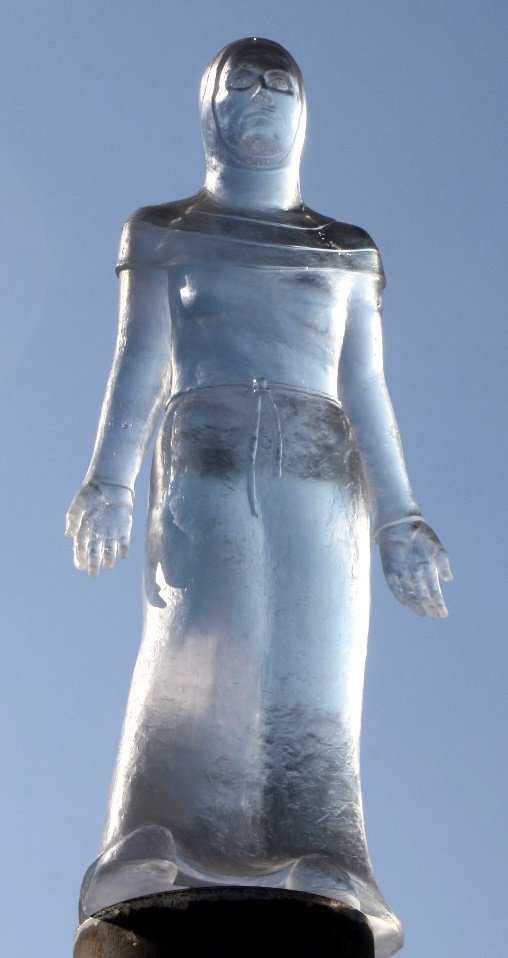 |
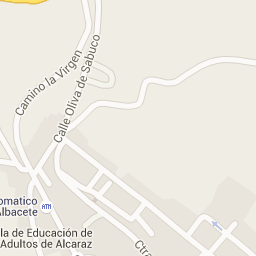 Left: This clear statue by Canadian Sculptor Susan Turcot of Mechthild of Magdeburg commemorates her work "The Flowing Light of the Godhead." It is on public display in the town of Magdeburg, Germany.  Above: Self-explanatory Paris street sign. | |
 |
Left: In Provence, France, a street named after Olympe de Gouges in Saint Maximin village. |
9. Website Reorganizaton:
"Kate's Pages" are once again "Women Philosophers dot com." Sort of.
 Kate Lindemann, Ph.D., Professor Emerita, Mount St. Mary's College, NY Kate Lindemann, Ph.D., Professor Emerita, Mount St. Mary's College, NY |
The website, http://www.women-philosophers.com no longer has a separate existence in cyberspace, but is now fully integrated into the sswp.org website. Effective immediately, searches for women-philosophers.com will roll over to sswp.org. And, because the term "Kate's Pages" is not the search term used by people seeking information about women philosophers, those pages will be renamed "women philosophers" to assure that internet traffic to this important resource on our site is not lost. Of the XXX visitors to SSWP, org each month, half begin with "Kate's Pages," before browsing through our members' books and other pages. |
10. The Many Years Long, Seemingly Never-ending, Continuing Saga of
Busted!! A Pictorial History of Women Philosophers
|
Volume 2: The Late Renaissance through the Enlightenment 1600-1799 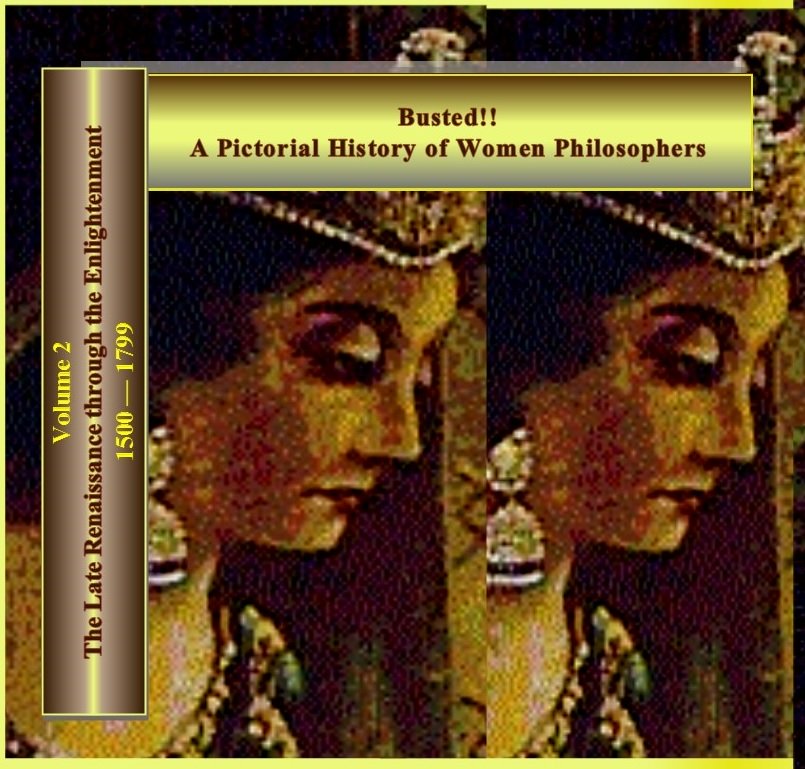 Front Jewel Case Insert Volume 2: The Late Renaissance through the Enlightenment Front Jewel Case Insert Volume 2: The Late Renaissance through the EnlightenmentDorothy Rogers and her trusty audio/visual engineering student Charisse Meyers are working out the final time signatures and are just about ready to burn the DVDs for Volume 2 of the Busted!! series. A list of the 37 women philosophers it features was published in the March 2015 Newsletter in the Archives. The American Philosophical Association has contributed support towards the production costs of this volume. Want yours? Renew your membership at the level of Philosopher-Queen or Salon. Remember, these are not for sale anywhere. In order to encourage professors to assign students to do research on the history of women philosophers, DVDs in the Busted!! series come with links to a downloadable print or Braille Bibliography. Bibliographies vary in length from more than 100 entries for Volume 1 to 500 entries for Volume 4. Moreover, each volume includes links to downloadable print copies of the narratives in order to enable hearing-impaired students to follow the presentation. For professors, each DVD includes links to a downloadable topical index so that philosophers can be presented according to their areas of specialization in the discipline. |
Volume 3: The Nineteenth Century 1800-1899
Below are the names of 40 women philosophers of the 19th century whose contributions to the discipline are presented in the 3rd DVD of the Busted!! series.
We acknowledge the generous support of the American Philosophical Association towards the production costs of this volume.
|
|
11. Calls for Submissions:
Women-Philosophers dot com
IAPh
JAPA
Women-Philosophers dot com
Please Volunteer to write a page about one of the following philosophers. Just send an email to sswpdues@gmail.com indicating which philosopher you would prefer to write about.
If you wish to suggest the inclusion of a philosopher not named below or on our women philosophers dot com pages, please send an email to sswpdues@gmail.com with a brief description of that woman's role in the discipline.
NOTE: Only deceased philosophers are featured on these pages. (It's a legal matter regarding unauthorized biographies of living persons.) If you are dead, let us know and we'll feature you on women philosophers dot com. :)
|
Elizabeth Flower Beatriz Galindo(a) Charlotte Perkins Gilman Anna Julia Cooper Sor Juana Ines de la Cruz Sophie de Grouchy Amelia Hathaway Heloise Jeanne Hersch Julia Ward Howe Liubo Isaakovna Akselrod Emily Elizabeth Constance Jones Marietta Kies Adrienne Koch Alexandra Kollontai Lenore Kuhn Elizabeth Sanderson Haldane Christine Ladd-Franklin Grace Mead Andrus de Laguna Francoise Marquise de Maintenon Rowena Morse Mann Marguerite of Navarre Hedwig Conrad-Martius Lucia Ames Mead Lucy Sprague Mitchell |
Mary Mothersill Dorothy Wrinch Nicholson Margaret Fuller Jacqueline Pascal Elizabeth Palmer Peabody Charlotte Perkins Gilman Margaret More Roper Clemence Royer Sarah Ruddick Marguerite de la Sabliere Lou Andreas Salome Caroline Schlegel-Shelling Madelene de Scudery Ann-Margaret Sharp May Sinclair Madeleine de Souvre Germain de Stael Edith Stein Helene Stocker Eliza Sunderland Jessie Taft Evelyn Underhill Camila Urena Louise de la Valliere Marianna Bacinetti di Waddington Ella Flagg Young Blanche Zehring |
"You don't know what you've got 'till it's gone..."
-Joni Mitchell
Help SSWP grow women-philosophers dot com into a resource for undergraduate/novice researchers!
The 16th Symposium of the International Association of Women Philosophers
Women and Philosophy: History, Values, Knowledge
To be held at Monash University, Caulfield Campus, Melbourne, Australia
7-10 July 2016
Founded in 1976, the International Association of Women Philosophers (IAPh) is an organisation committed to promoting discussion, interaction, and cooperation among women in philosophy worldwide. In honour of the IAPh’s 40th anniversary, this symposium proposes to celebrate women’s diverse historical and contemporary contributions to philosophy, and to highlight the work of female philosophers in all branches of philosophical and feminist inquiry. We particularly invite papers that reflect on the history of women’s engagement with philosophy and feminism in Europe, the Americas, Australasia, Asia, Africa, and elsewhere, during the past forty years, and back to the earliest periods. The conference themes, history, values and knowledge reflect the broad scope of contemporary research on historical women philosophers, on feminist ethics and politics, and on questions of feminist epistemology. Submissions in other areas of philosophy and feminist theory are also welcome.
Invited speakers:
Moira Gatens (Sydney, Australia),
Ruth Hagengruber (Paderborn, Germany)
Sally Haslanger (MIT, US),
Lisa Shapiro (Simon Fraser, Canada)
Abstracts of no more than 300 words, accompanied by a biographical note of 100 words, should be sent to the organisers (iaph-symposium@monash.edu) by 30 September 2015. Acceptances will be sent out by end of January 2016.
In addition, please choose at least one descriptor from those provided below, and include your choice(s) with your abstract.
1. History of Philosophy (Ancient, Medieval, Early Modern, Enlightenment, Nineteenth-century, Twentieth-century, Other)
2. Feminist Theory and/or Philosophy (European, Asian, African, American, Australasian, Other)
3. Value Theory (Meta-ethics, Ethics, Bioethics, Environmental Ethics, Political Philosophy, Other)
4. Epistemology (including Philosophy of Science)
5. Metaphysics (including Philosophy of Mind, Philosophy of Religion)
6. Philosophy of Language (including Logic, Philosophical Logic)
Journal of the American Philosophical Association
This new journal is seeking submissions in any area of philosophy and is also seeking individuals who are willing to referee submissions on the history of women philosophers.
To submit an article for refereeing, see this PDF.
To submit your name as a prospective referee, email the editor John Heil: jh@wustl.edu
12. Reminders: You shouldn't need them, but...
Amazon.com wants to give us money! All you need to do is shop!
Now, how hard can that be???
|
1. Go to www.smile.amazon.com |
2. Login to your Amazon account (or create one). | |
|
3. If this is the first time you are logging into Amazon Smile you will receive a prompt to pick a charity. If you’ve been to Amazon Smile before, go to the Account menu in the upper right and select Charity. |
4. In the “Pick your own Charitable organization” box, type in either “SSWP” or “Society for the Study of Women Philosophers.” |
5. Click the Select button, and voila!
Even if you forgot and started at Amazon.com, you will be asked if you want to go through Amazon Smile. It's an instant transition that won't cause you to lose any data if you're in the middle of shopping.
SSWP receives ½ of 1% of qualified purchases (does not include subscriptions). So if you buy $100 worth of books, or a $100 Barbecue grill, SSWP will receive 50 cents. That might not sound like much, but if 20 members each spend $100/month on Amazon by going through Smile.amazon.com, that’s $120/year contributed to our Scholarship fund. That amount alone will enable a student member to stay a night in the hotel in order to present a paper at our session! Please enable this no-cost contribution to our organization by taking the time to set up your Amazon smile account. If you also have Amazon Prime, your purchases will still ship for free.I
Pay Your Dues. We know you're embarrassed, but...
Oh, you haven't paid your dues? Hmm.. If you haven't paid your 2015 dues, please do so NOW! Click here: Pay Dues. We can't make it any easier.
Why pay dues?
- Just look at the increasing number of conferences, professional societies, web sites and publications now devoted to women in the history of philosophy. Help scholars who find them find you. (Plus, you save us the work of removing your books from our site.)
- Renew at the Philosopher-Queen or Salon level to receive one of our premiums.
You've paid your dues for 2015?
This website has been lovingly constructed to help promote your work, your research interests and your professional life. Your dues pay for it: so use it!
- Please complete your online member bio and research interests form so that others can network with you.
- Visit our "Must Buy" pages and if one of your books about women in philosophy is not there, email a jpeg of the book cover together with full bibliographic publishing information to sswpdues@gmail.com. in the Subject box write: "Display My Book." If the title of your book is not in English, kindly also provide an English translation of the title.
 Well, almost gone! |
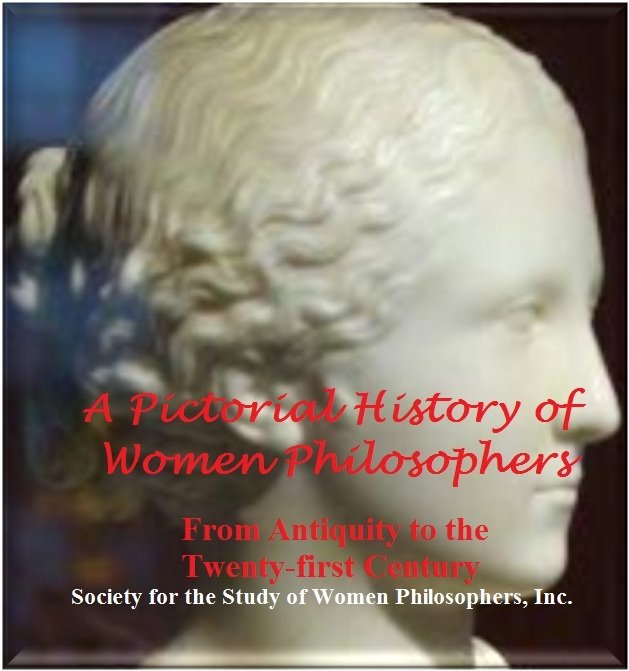 |
Many members have received as their premium, a copy of the Photo Album.
There are only 3 copies remaining!
Once they're gone, they're gone.
If you haven't yet paid your dues at the level of Philosopher-Queen or Salon, do so now and the first three members requesting the album (rather than a DVD) will receive it.
13. Correction: IAPh Call for Papers
IAPh--International Association of Women Philosophers
The previous CFP published in our March, 2015 Newsletter incorrectly stated that presenters needed to be IAPh members. Whether or not you are also an IAPh member, if you wish to submit, keep in mind that the deadline is September 30th for 300-word abstracts. For details, go to: http://artsonline.monash.edu.au/iaph2016/call-for-papers/.
Thanks to Jacqueline Broad for bringing this error to my attention.
-Mary Ellen Waithe
14. SSWP Website:
Our Visitors in April, May and June 2015
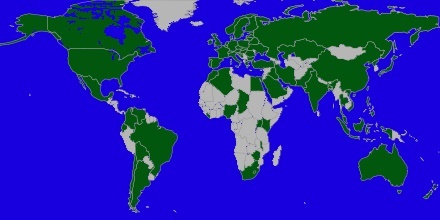
|
How many visitors do we receive? April: 2625 visits by 1209 unique users from 62 countries May: 2603 visits by 1098 unique users from 68 countries June (through 20th) 2290 visits by 1065 unique users from 76 countries. From where do we draw visitors to our site? From the NINETY-ONE non-gray countries! Our website is growing and is being viewed by more and more people from more and more countries each year. The list at the right shows the country of origin of visitors to our site during April, May and June of 2015.. As you see, we are viewed by visitors from North America, South America, Asia, Africa, Australia, Oceana and Europe. What are these visitors looking at when they come to our site? All land on our Home Page. Approximately half read through our membership information pages. Approximately half read one or more "Kate's Pages" about individual women philosophers. This means that we are now equally serving professional philosophers who research and write about women philosophers and students or members of the public who want to learn about those philosophers. We hope that more of those students will consider becoming student members of SSWP. Do you have colleagues in other countries? Send them a link to our website the next time you email them. Tell them what a resource it is for them, their colleagues and their students. Ask them whether they know of women from their country who contributed to the history of our discipline. Suggest that they join SSWP and/or that they submit an article to Women Philosophers dot com about women philosophers from their tradition. 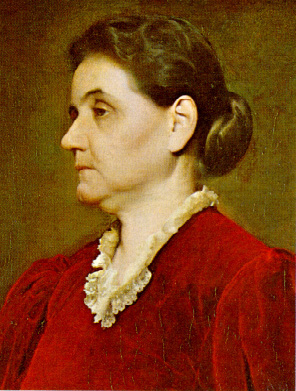 Jane Addams Jane Addams 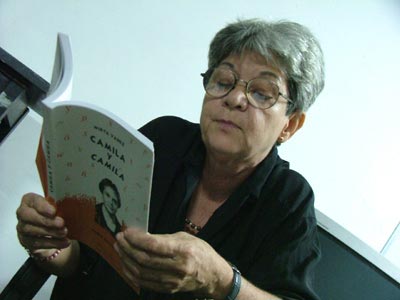 Camila Enriquez-Urena Camila Enriquez-Urena |
|
(Yet Another!) Request for Volunteers
No officer of SSWP receives a salary or reimbursement of any kind for their work. Despite this, the following all get done:
- the Website is maintained and updated, alternate spellings of our name and our research area are paid for and "parked" so that traffic generated by those searches comes to our site,
- Newsletters are prepared,
- Dues are collected and banked in a SSWP account,
- Records of members, their dues payments and contact information are updated,
- premiums are created and paid for,
- Grants are applied for, projects (the DVDs) completed, and reports filed with grantors,
- US tax returns are completed and filed,
- accounts at PayPal, Square and the PNC Bank are monitored and balanced,
- CFPs and Meetings are scheduled with the APA.
If these tasks must be outsourced, the costs would consume our financial assets.
Won't you help with some of these necessary (if unglamourous) tasks? Consider it part of your university-required service to the profession.
Send an email to sswpdues@gmail.com with "I'LL HELP OUT" in the Subject line.
Thanks,
Mary Ellen Waithe
Society for the Study of Women Philosophers